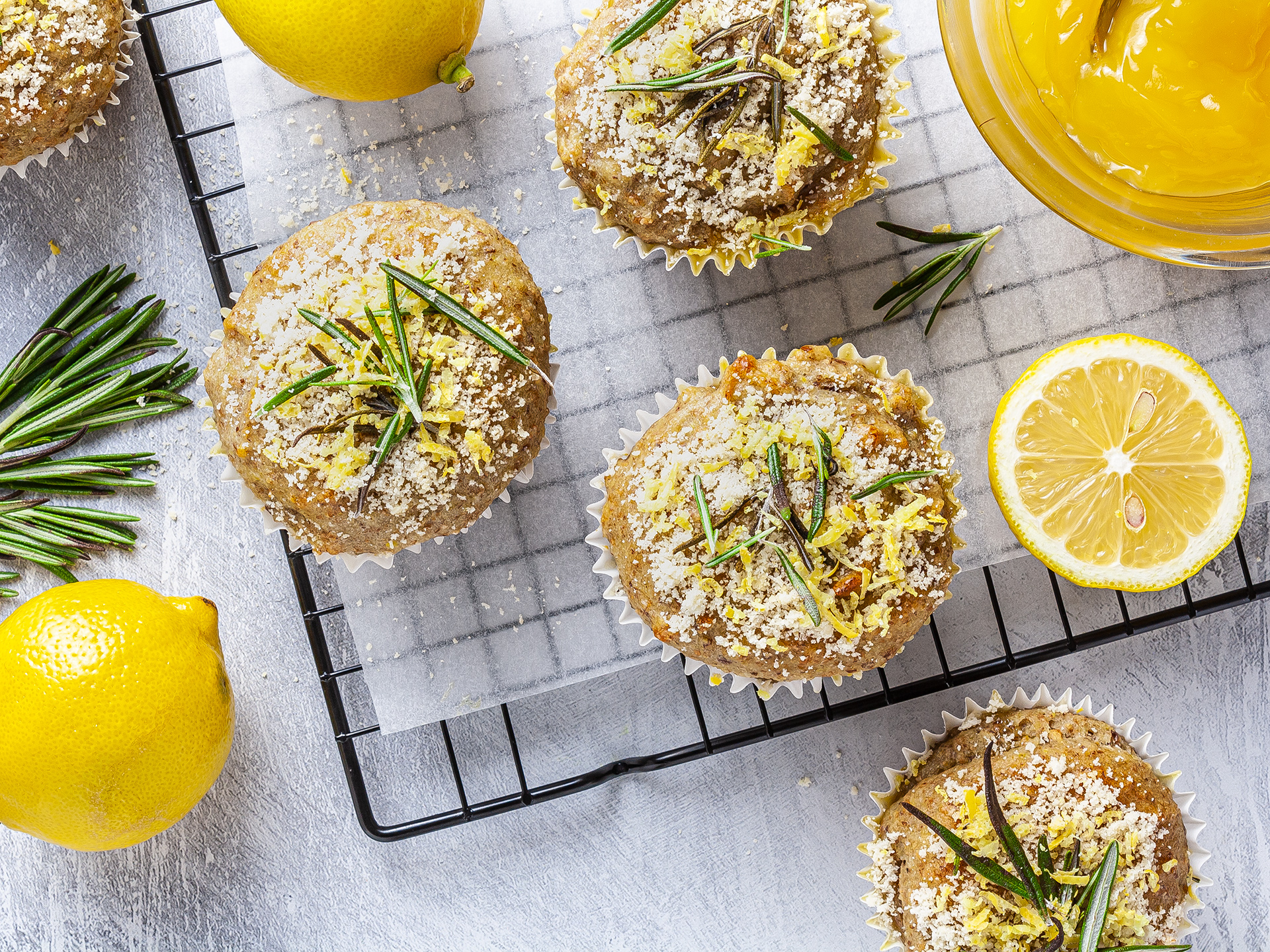Nothing beats the refreshing taste of lemon on a hot summer day, especially if it comes in the shape of a muffin! Today, we show you how to make wholesome lemon muffins, garnished with rosemary for extra flavour.
This recipe is fantastic, as it's both vegan and sugar-free. We have only used plant-based ingredients, and we replaced all sugars with naturally-sweet bananas. These lemon and rosemary muffins bring a happy face without any guilty afterthoughts. If only all sweets could do this!
Moreover, thanks to a combination of almond meal and wholewheat flour, each muffin provides you with 18% of your RDI of fibres. Fibres are essential to any diet, as they help curb our hunger and make us feel satiated for longer. As a result, we are less prone to foraging the cupboard for unhealthy snacks.
To make the muffins even yummier, we have added a surprise in the centre: a melted heart of vegan lemon curd. Imagine biting into that!
Compare the nutritional profile from one of these muffins with that of a traditional one, and with our recipe, you'll get three times fewer sugars and four times more fibres! Pretty impressive for being a muffin, right?
So instead of dreaming about these treats, how about we bake them together? Follow our easy recipe below and get it done in just 40 minutes!
How long will these lemon muffins last?
Being quite moist, we recommend you store these muffins in an air-tight container or zip-lock plastic bags in the fridge for up to three days.
Alternatively, you can freeze them on the same day in single-serving pouches and they will last for up to a month.
Just leave them to thaw completely at room temperature for one hour or heat them still frozen in the microwave or oven until softened.
How can I make these muffins without oil?
In this recipe, we have used vegetable oil as a butter replacement, but of course, you can also make these muffins oil-free. To do so, swap the oil with other sources of fats like avocados, nut butter, or Greek yogurt - if not vegan.
Alternatively, applesauce and pumpkin puree are other great substitutes for oil and butter in baked goods if you want to keep the overall fat content of the recipe low.
If you swap oil with these oil alternatives in a ratio of 1 : 1, you'll have to adjust the amount of the wet ingredients to get the same batter consistency.
Check out how we've done it in these avocado muffins, chocolate muffins, or pumpkin muffins recipes.
Is it best to use lemon essence or lemon juice?
In this recipe, we have used lemon essence to give the muffins a zesty and fresh flavour without adding that tart aftertaste that you would get from lemon juice.
Lemon extract better packs the full flavour of this fruit as it's made from the oil of the lemon, not the juice. Therefore, it's the perfect addition to baked goods like cakes, muffins, and cupcakes.
Lemon juice, instead, is quite bitter and acidic, and it can make the batter wetter. However, if you don't have lemon essence at hand, you can use lemon juice in this recipe and increase the amount of bananas to add more sweetness.
How to make them gluten-free?
You can make these rosemary muffins gluten-free by doubling the amount of almond flour and removing the wheat flour in this recipe.
However, we recommend you add a binder to help the batter better hold together. For example, you can add a few tablespoons of potato starch, arrowroot starch, or maize starch.
Also, you can increase the amount of "flax-eggs" or bananas - both great binding agents - and adjust the amounts of dry ingredients to get the same consistency of the muffin dough.
Moreover, you can use other gluten-free flours like ground oats, coconut flour, or buckwheat flour.
Check out these avocado muffins, chocolate apricot muffins, or raspberry muffins recipes for inspiration.
Ingredients
| Ground Flaxseeds | 2 tbsp |
| Water | 60 mL |
| Bananas | 2 |
| Wholemeal Flour | 160 g |
| Almond Flour | 160 g |
| Baking Powder | 1/2 tbsp |
| Lemon Essence | 1 tsp |
| Almond Milk | 150 mL |
| Canola Oil | 60 mL |
| Lemon Zest | 1 tbsp |
| Vegan Lemon Curdrecipe | 100 g |
| Fresh Rosemary | to taste |
Step 1
Let's start by preparing the vegan "flax-egg".
In a small bowl, add the ground flaxseeds and water and stir well. Leave the seeds to soak for 10 minutes in the fridge until they form a viscous gel-like mixture.
Meanwhile, blitz the bananas in a food processor into a creamy mash.
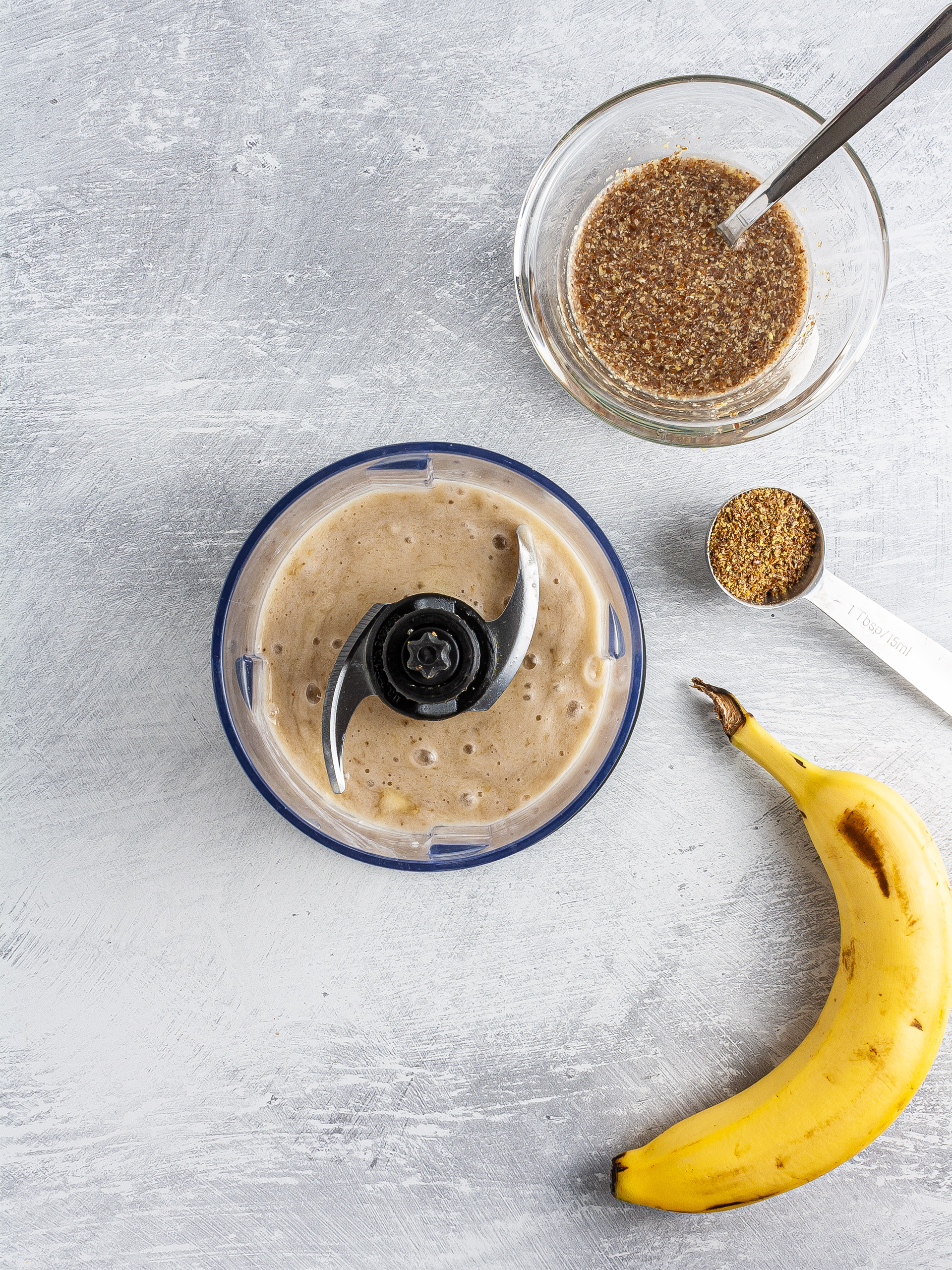
Step 2
In a mixing bowl, combine wholemeal flour, almond flour, and baking powder. Stir well to ensure the baking powder is evenly distributed.
Then, incorporate the prepared "flax-egg", lemon essence, almond milk, oil, lemon zest, and mashed bananas.
You can use a whisker, hand mixer, or simply a spatula to mix the ingredients into a smooth batter.
However, avoid over-mixing, as by doing so, the dough will become stiff, and your muffins will be tough and chewy when baked.
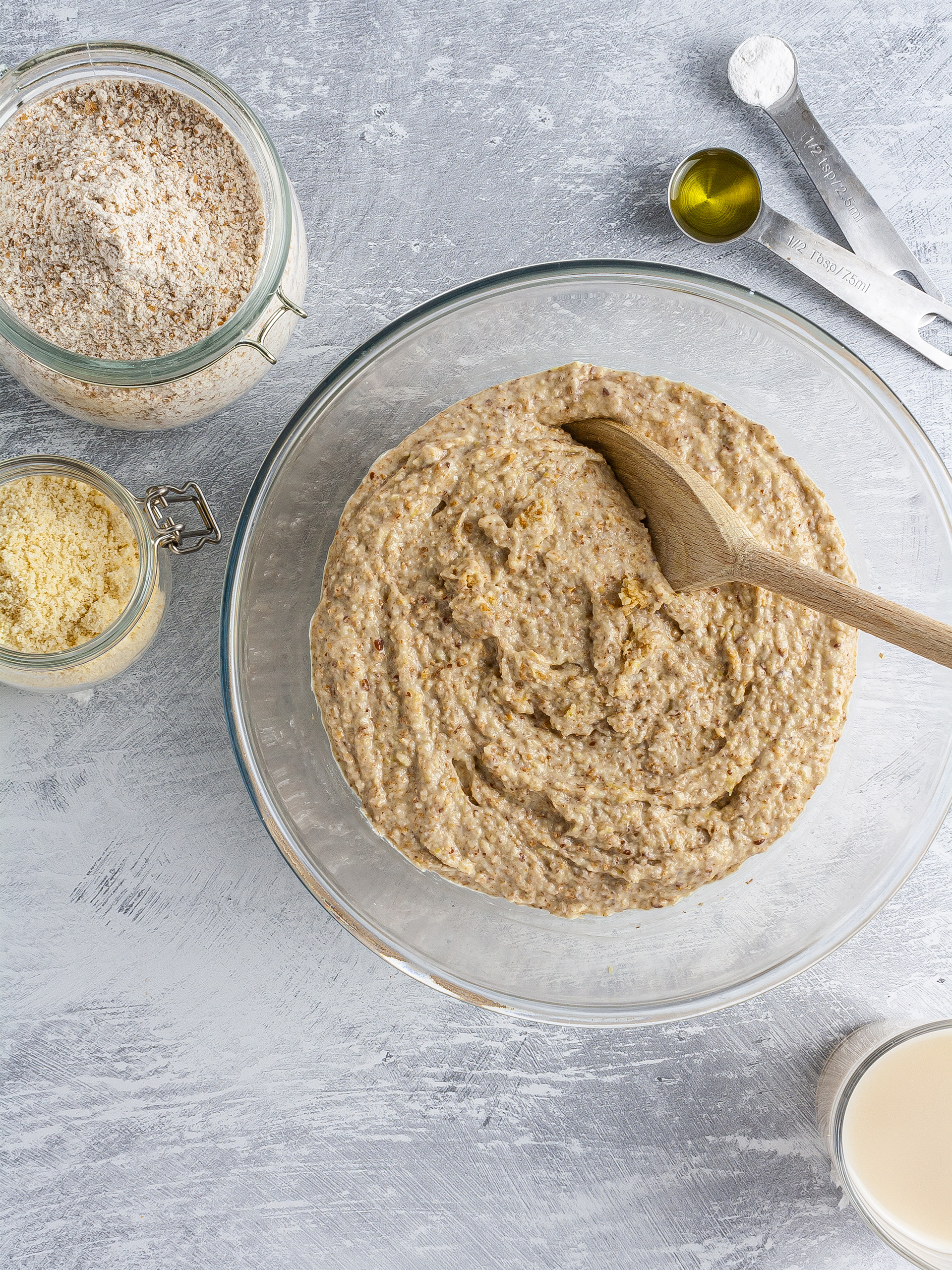
Step 3
Next, grease and flour a muffin tray or line it with paper cases.
Pour the batter in each case filling halfway up and then add one teaspoon of lemon curd in the centre.
Repeat this step for all the muffin cases.
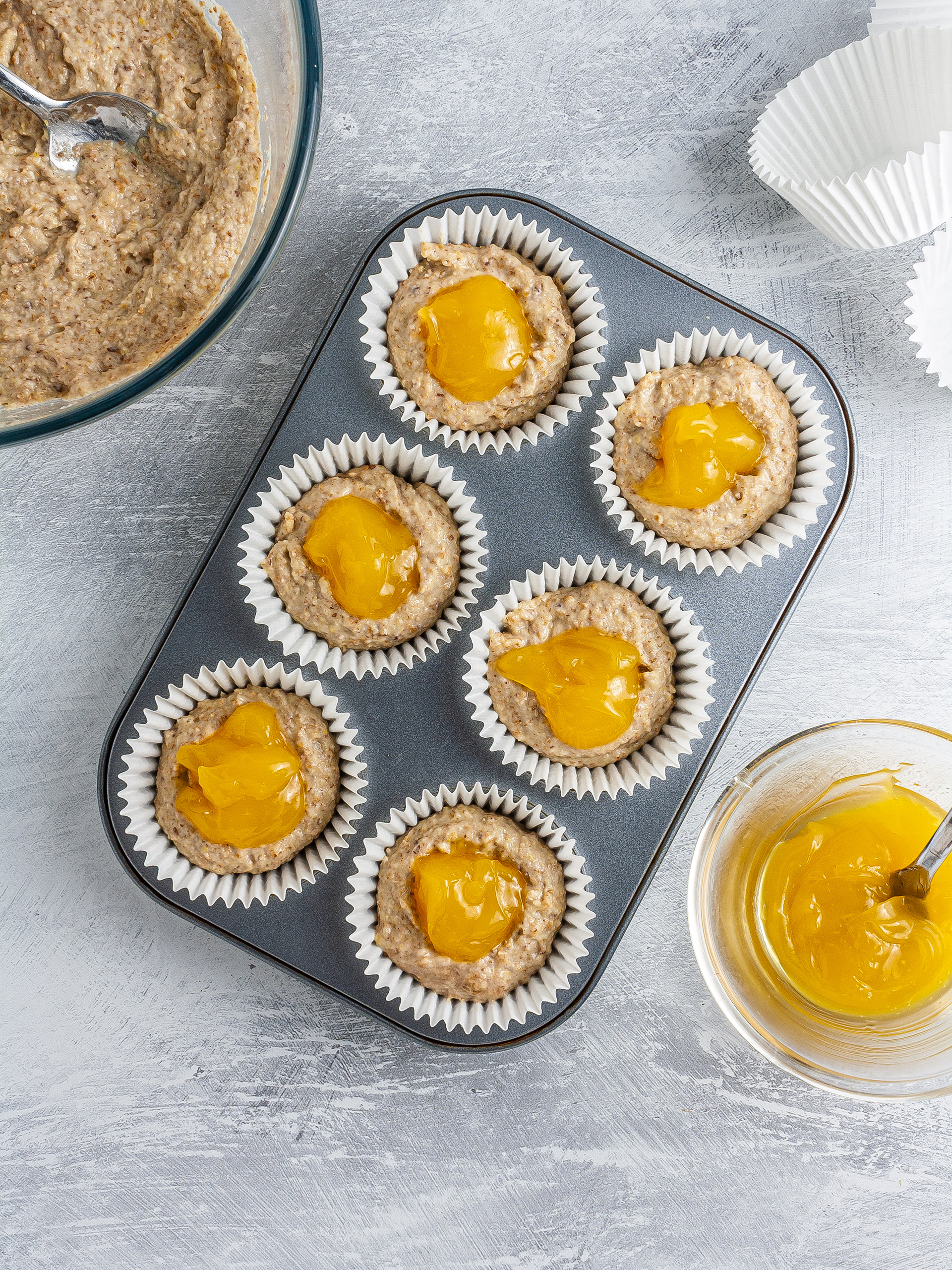
Step 4
Now, cover the lemon curd with a dollop of batter filling the muffin case to the top.
Repeat this step until you have used all the batter. Please make sure the lemon curd is well sealed under the muffin mixture otherwise it will leak from the case edges when baking in the oven.
Next, sprinkle the top of each muffin with some almond flour for extra flavour, and then garnish with fresh rosemary.
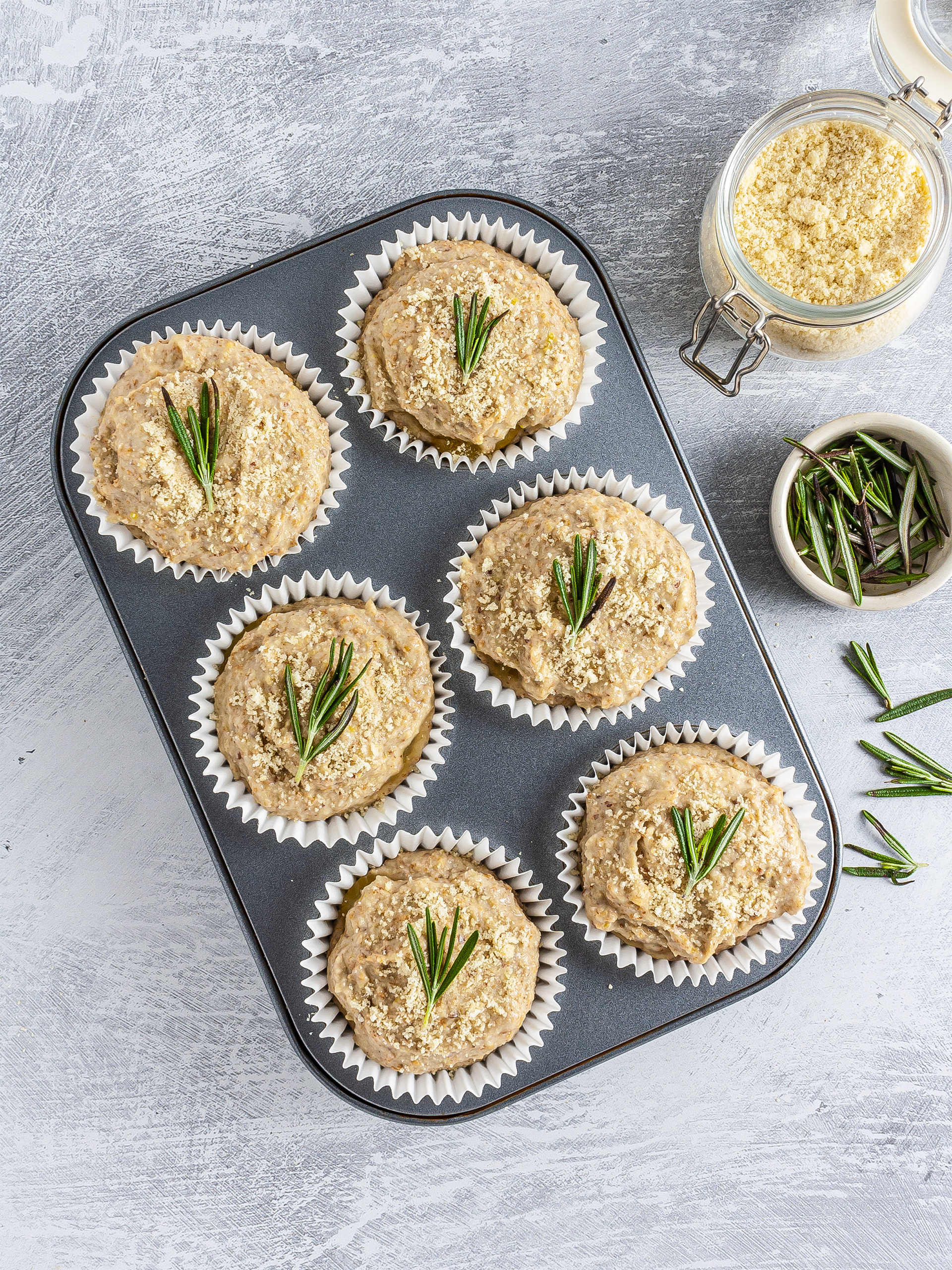
Step 5
Bake the lemon muffins for 18 minutes at 200°C (390°F) for static ovens or at 180°C (355°F) for fan ovens.
They are ready when a skewer inserted in the centre comes out clean.
Leave the muffins for 5 minutes in the oven turned off to cool down gradually. By doing so, you'll also prevent them from collapsing due to a sudden change of temperature.
Finally, remove your rosemary bakes from the tray and transfer them onto a cooling rack before serving.
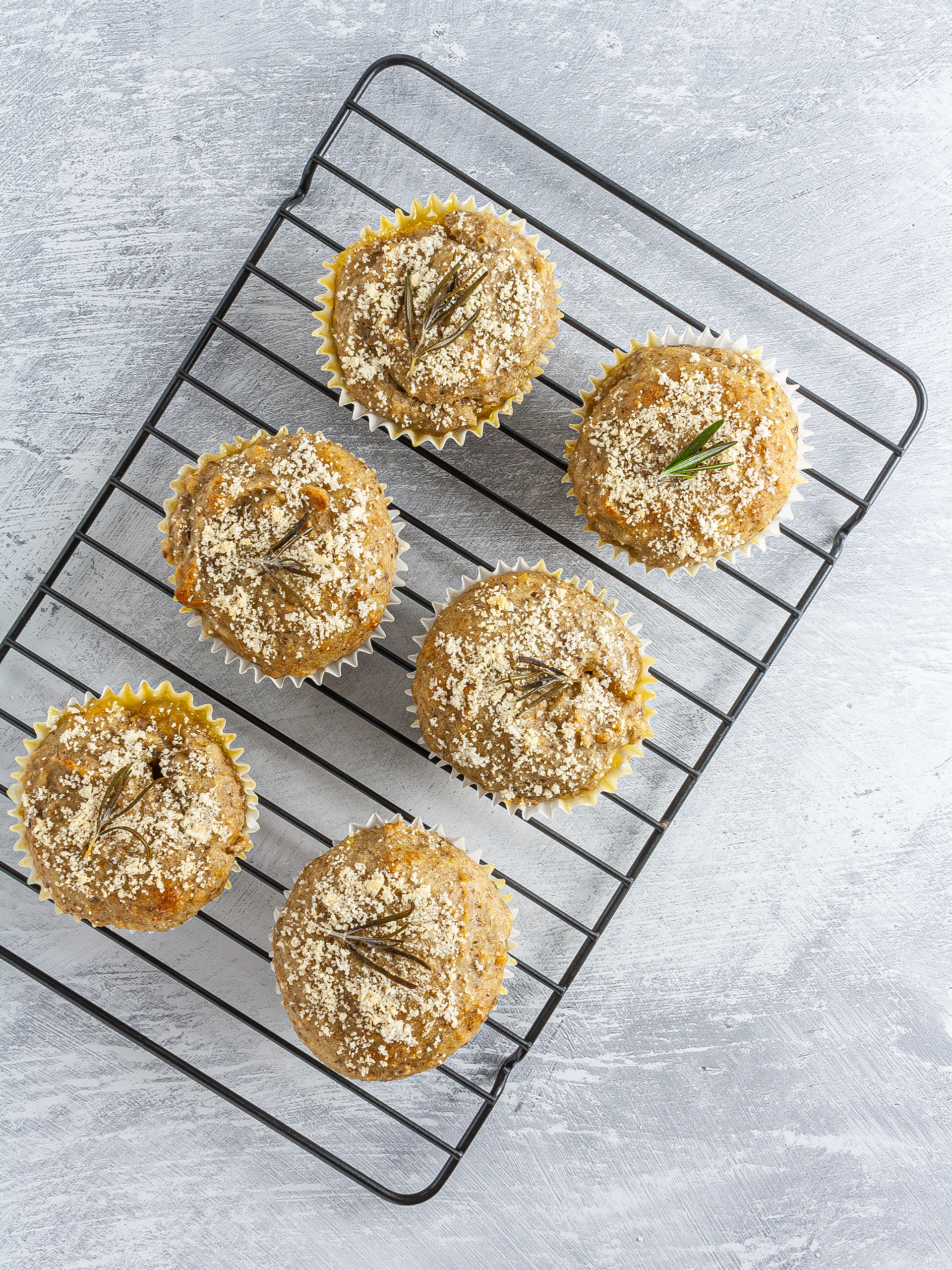
Tips
For extra flavour, add a teaspoon of dried rosemary to the muffin batter.
You can replace almond milk with other plant-based milk, like oat, rice, hemp, or soy milk.
Instead of canola oil, you can use coconut oil, olive oil, or sunflower oil
